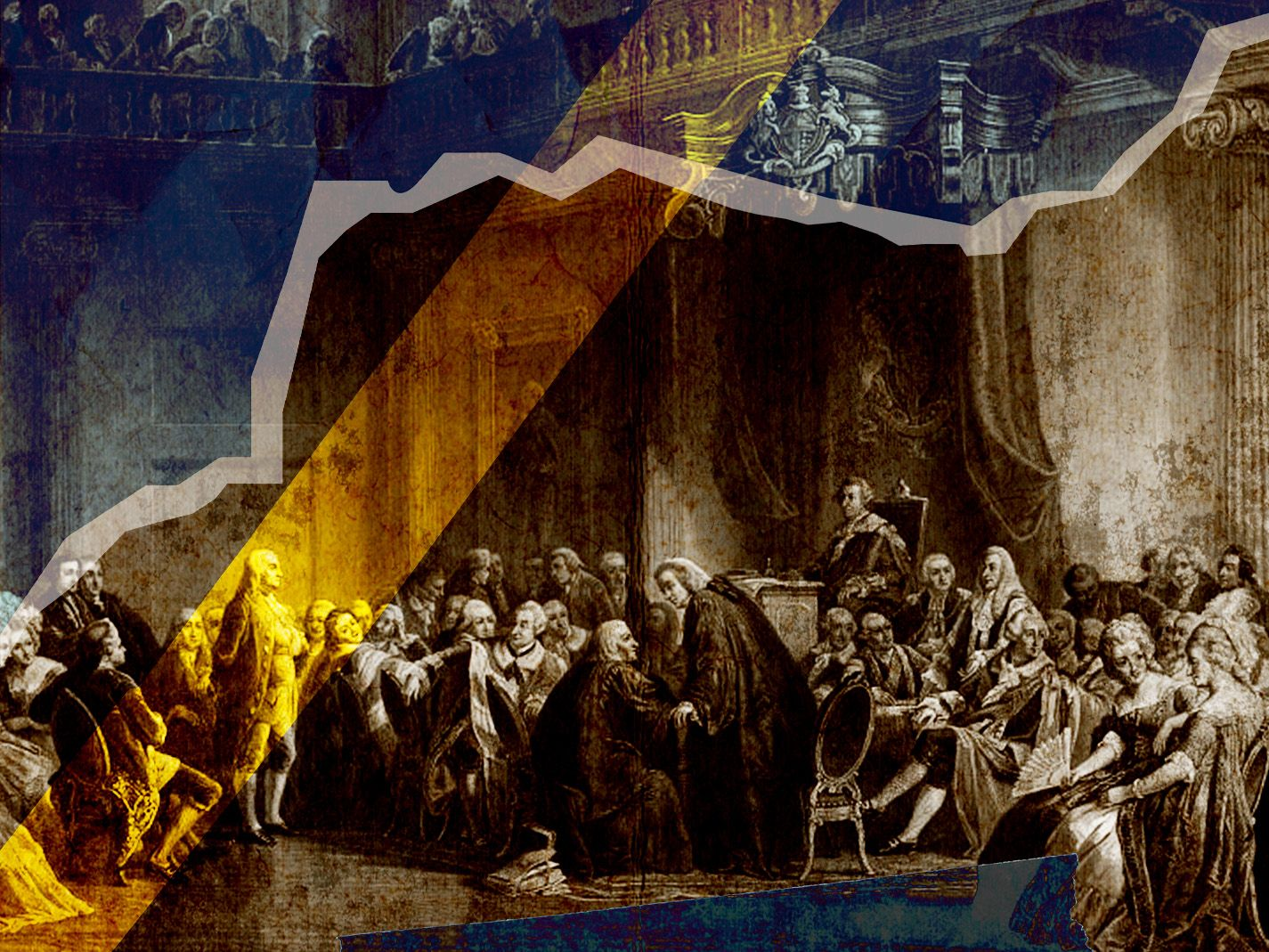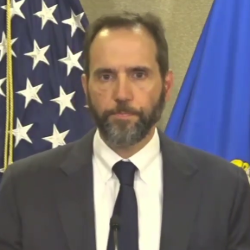
The nation’s 250 Anniversary is only 29 months away. The National Association of Scholars is commemorating the events that led up to the Second Continental Congress officially adopting the Declaration of Independence on July 4, 1776. This is the second installment of the series. Find the first installment here.
In December, we celebrated the anniversary of the Boston Tea Party. Two days ago, we took note of the raw feelings in Boston that led to the tarring and feathering of a Loyalist tax enforcer. Today, we shift the scene to England, where the colonists’ emissary received contemptuous treatment from the British government.
Gallery

Liz Cheney — Congresswoman, 2017 – 2023 — Wikimedia Commons

Letita James — Attorney General of New York — Wikimedia Commons

Fani Willis — Fulton County, Georgia District Attorney — Facebook

Jack Smith — Special Counsel for the United States Department of Justice — Wikipedia
Burned by Wedderburn
In January 1774, Benjamin Franklin was in England attempting to persuade the British government to lighten up on its American colonies. Franklin’s official position was Postmaster of the Colonies and was acting as the agent of Massachusetts. On January 29, he went before the Privy Council to learn whether the British government would heed Massachusetts’ petition to replace the colony’s governor, Thomas Hutchinson, and lieutenant governor, Andrew Oliver.
Massachusetts wanted them removed because they were nurturing the idea of curtailing the “English liberties” of Massachusetts residents. The public knew this because Franklin had somehow gotten hold of letters between Hutchinson and Oliver in which they discussed the idea. How exactly Franklin obtained those letters is unknown, but perhaps we should imagine a source inside the colonial government that was friendly to the colonists’ position.
Franklin intended to use the letters in pursuit of quiet diplomacy, but the Speaker of the Massachusetts Assembly, to whom Franklin had entrusted them, leaked them. The resulting public furor led to the petition in which the colony asked that the two men be removed from office.
When Franklin appeared before the Privy Council, he was subject to an hour-long harangue by Alexander Wedderburn, the solicitor general and first earl of Rosslyn, who spent most of his energy attacking Franklin’s character. As recounted by Charles Greifenstein:
‘Private correspondence has hitherto been held sacred,’ [Wedderburn] bellowed. Franklin ‘has forfeited all the respect of societies and of men.’ ‘He will henceforth call it a libel to be called a man of letters,’ a pun on Franklin’s position as postmaster. Wedderburn declared, with a sly reference to Franklin’s experiments with electricity, that he ‘stands in the light of the first mover and prime conductor of this whole contrivance against his Majesty’s two Governors’ and accused Franklin and the radical coterie in Massachusetts of spreading sedition.
Through it all, Franklin stood still, showing no emotion, ‘conspicuously erect, without the smallest movement of any part of his body,’ his unchanging expression tranquil and placid. His dignity and forbearance made him the strongest presence in a room full of powerful men.
After the diatribe, Wedderburn declared that he was ready to examine the witness, Franklin replied that he did not chose to be examined. After the chamber was cleared of spectators, the Privy Council turned down the petition.
It didn’t end there. The government also fired him from his position as Postmaster. As Greifenstein observes, “January 29, 1774, turned Franklin from a conciliator into a revolutionary.” Benjamin Franklin, of course, would go on to his crucial diplomatic role in bringing France to the aid of the United States. He negotiated the Treaty of Alliance with France that brought Lafayette, French arms, and financial assistance to the Patriots.
Annals of Disrespect
The stories we usually hear about the events that provoked the American Revolution focus on the economic grievances of the colonies and the sense of Americans that they were being unfairly treated by the Crown. The Sons of Liberty and other domestic agitators built relatively small discontents into a larger and larger public anger.
But the Revolution also began with personal slights.
Prominent Americans such as George Washington keenly felt the disrespect of British officials. Resentment towards those who abused their positions and powers by treating the complaints of Americans with contempt and ridiculing protests as insurrection was the accelerant to the Revolution. The hubris of officials, of course, is always with us, and it is always a provocation to stronger discontent.
A poem by David Randall, Director of Research at National Association of Scholars
A metal wire moves lightning’s fire;
A stove can grow too hot.
A placid man can grow enraged
If you respect him not.Good government discovers how
To make a fair solution;
A petty tyrant’s sharp contempt
Creates a revolution.Humiliate a scientist
And find he has undone
The bonds that made an orb revolve
Around your distant sun.
Editor’s Note: On December 16, 2023, Dr. Wood delved into Benjamin Franklin’s endeavors in England, his crucial role as Postmaster, and the historical significance of the Boston Tea Party. Just four days ago, he explored the compelling narrative of the tarring and feathering of Loyalist John Malcolm, shedding light on the impact of unequal justice on revolutionary fervor. And, in this third installment, Dr. Wood examined Franklin’s consequential appearance before the Privy Council on January 29, 1774, unraveling the disrespect he endured and its transformative effect, turning him into a revolutionary figure. Looking ahead to the fourth installment of this series, set to be published on February 24, Keith Whitker will take us through Peter Oliver’s impeachment.
Art by Beck & Stone
Respectfully, the Loyalists didn’t much like John Malcolm either.
They’d fired him in South Carolina but for some reason Hutchenson rehired him and put him in Maine. That’s the untold story of the Revolution — how people like Governor Hutchenson largely CAUSED the Revolution…